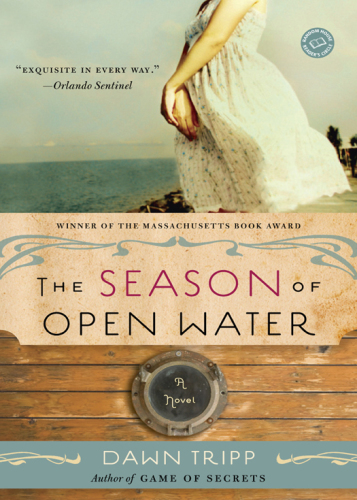
The Season of Open Water
A Novel
کتاب های مرتبط
- اطلاعات
- نقد و بررسی
- دیدگاه کاربران
نقد و بررسی

May 30, 2005
Set in a coastal New England town caught up in the Prohibition-era rum-running trade, Tripp's second novel (after Moon Tide ) illuminates the period's dark underbelly as it explores a family forever changed by the allure of its precarious prosperity. Written from alternating perspectives, the book opens with a flashback to Noel Dowd's whaling days, nearly 60 years earlier, though the bulk of the story belongs to his willful and fiercely independent grandchildren, Bridge and Luce. The brother and sister share an unusually close relationship, approached only by the bond between Bridge and her grandfather. The siblings' relationship is put to the test as 18-year-old Bridge grows closer to Henry Vonniker, a former doctor shattered by the horrors of World War I, and Luce becomes embroiled with Honey Lyons, a local rum-running kingpin. Meanwhile, Noel, with the help of his former shipmate Rui, invests his entire savings in stocks, oblivious to the impending market collapse and the devastating depression that will sweep the nation. While Tripp's impressive research and attention to detail add to the story's heft, the creeping pace of her narrative can undermine the novel's passion and intensity. However, this restraint allows the reader ample time to savor Tripp's elegantly crafted characters, whose joys, sorrows and humanity far outweigh the excitement of a boat chase or the thrill of a romantic encounter.

April 15, 2005
Set in coastal Massachusetts in the late 1920s, Tripp's second novel (after "Moon Tide") revolves around family, relationships, and the human costs of Prohibition. Bridge and her brother, Luce, have a close and complicated relationship. While Bridge is particularly fond of her grandfather, Noel, Noel recognizes the dangers that lie behind Luce's weaknesses and endeavors to steer Bridge from the path that Luce may want her to take. Luce feels particularly threatened as Bridge develops a relationship with a doctor whose own life has been irrevocably altered by his experiences in World War I. As Luce becomes increasingly involved in running cases of alcohol to shore, he relies on Bridge's help, jeopardizing not only her life but also the lives of others. Tripp achieves a good balance between character development and story line. Bridge, Noel, and Henry are particularly rich and add great value by revealing to readers their strengths and weaknesses. The pacing moves along via their voices and those of other characters in alternating chapters that maintain the drama of the night runs on open water. An enjoyable read, particularly when relaxing on a beach with a drink in hand. [See Prepub Alert, "LJ" 3/1/05.] -Caroline Hallsworth, City of Greater Sudbury, Ont.
Copyright 2005 Library Journal, LLC Used with permission.

May 15, 2005
In this story of a three-generation family in the late 1920s in a Massachusetts seacoast town, Tripp proves that she is no one-book wonder after her well-received debut " Moon Tide" (2003). There the foreboding came from a pending hurricane; here it's human-made, from the stock-market crash and--mostly--from the effects of Prohibition. Widower Noel, once a whaler, now builds boats; his daughter, Cora, a widow, takes in laundry; and her son, Luce, a born risk taker, gives up his ice trade for rum running, enticing his sister, Bridge, to work some jobs with him. The current between Bridge and Henry Vonniker, a doctor so damaged by the world war that he now manages a mill, eventually brings them together, despite differences in age and class, before Bridge joins Luce on one last job. Tripp's spare language is particularly appropriate to this time and place; she finds verbs that etch themselves into a reader's memory--waves "scour" in, light "chaps" the surface of the ocean--and her plot unfolds with both surprises and what seems inevitable.(Reprinted with permission of Booklist, copyright 2005, American Library Association.)

























دیدگاه کاربران